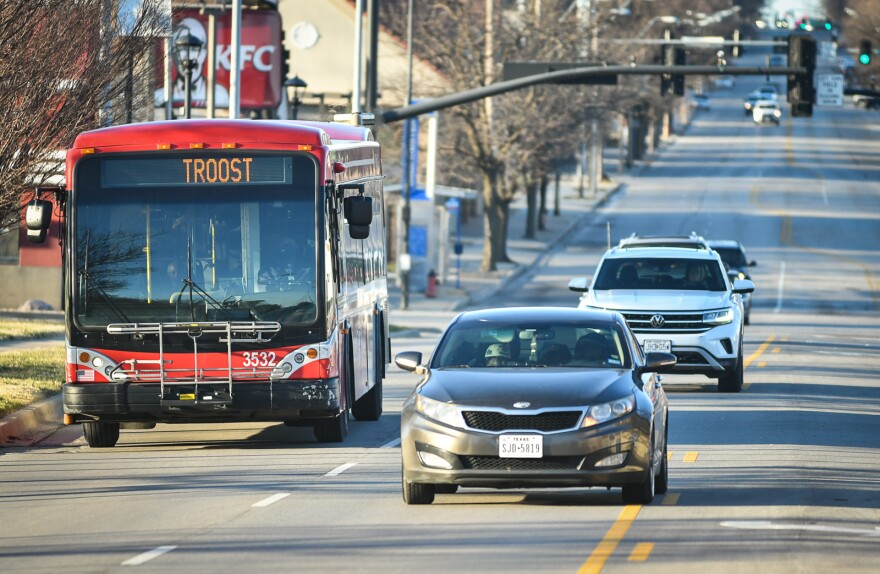This story was updated on April 24 at 12:45 p.m.
The precarious future of free rides on Kansas City buses is once again in front of city leaders. On Wednesday, a city council committee recommended that the full council renew its annual contract with the Kansas City Area Transportation Authority, to the tune of $70.9 million.
The council is scheduled to vote on the contract Thursday at 3 p.m.
The KCATA for months has discussed the possibility of ending the zero fare program it began in 2020. The KCATA has warned city officials that it’s standing at the edge of a fiscal cliff. In early March, KCATA officials told city council members that the agency faces a $26 million funding gap after COVID-19 federal relief dollars are spent by 2025.
The KCATA said the agency would have to make service cuts if it doesn’t find new revenue to fill that gap by next year.
A draft of the new contract between the KCATA and Kansas City says the city wants to provide zero fare for residents that meet “agreed upon eligibility requirements.” The KCATA and city officials will work together on a plan to provide zero fare or “functional zero fare” for people who rely on those services.
It’s unclear what will constitute “eligibility requirements,” and how residents will prove such eligibility. The contract doesn’t go into further detail about zero fare or what “functional zero fare” means.
City council member Johnathan Duncan said he interprets the phrasing in the drafted contract to mean that any person would need a bus pass to ride the bus, but the pass itself would be free. He said no one on the city council wants to end zero fare.
A KCATA spokesperson said the contract is vague because the agency wants to “spend the next year working with the City” on issues like zero fare.
The $70.9 million in proposed funding from Kansas City comes from two sales taxes: the 3/8ths-cent sales tax that voters renewed last November and the ½-cent public transit sales tax. The city would also continue paying for zero fare, as it has for the past four years, through $4.8 million from the public transit tax.
The prospect of eliminating zero fare worries Chad Onianwa, a member of climate action group Sunrise Movement KC, which has been advocating for city officials to maintain the zero fare program.
“Zero fare has just made riding the bus a lot more of a no brainer,” said Onianwa, who frequently rides the bus. “It makes it really simple getting around, at least. Especially if you know the bus routes and where they're going.”
Current ridership under zero fare has been high. Last year, the number of bus riders reached pre-pandemic levels.
A study commissioned by the KCATA found that reinstating fares from 2019 — $1.50 per ride — would generate between $5.8 and $7.1 million. The same study also found that charging bus fares again would cause ridership to decrease between 17% and 33% from 2019 levels.
The total cost of the KCATA to provide public transit in Kansas City — which includes bus service, paratransit and the recent, Uber-like service IRIS — is $113 million.
In addition to the two public transit taxes, revenue to pay for KCATA’s service in Kansas City would come from the state of Missouri, remaining federal pandemic dollars, passenger fare collected from IRIS and RideKC Freedom trips, and what the KCATA lists as “other funds.”
But those combined revenues fall $20.8 million short of the $113 million price tag. According to KCATA meeting documents from mid-April, the agency proposes taking money from Kansas City’s 3/8ths-cent sales tax reserve.
KCATA staff would need approval from the board of commissioners on a month-to-month basis to draw money from the reserve fund. At the same time, the agency says it will work with Kansas City to “find savings that have minimal impact to the community in order to reduce the Total Estimated Service Cost and reduce the amount of Reserve needed.”
KCATA officials have pointed to the safety of bus drivers as one reason to bring back bus fares. Nicholas Miller, president of the local amalgamated transit unit, told council members in March that bus operators are feeling less safe since zero fare was implemented.
“Zero fare was put out there freely with no structure involved,” Miller said. “So the passengers have been given a sense of entitlement that has been taken away from operators.”
But Onianwa said officials are using zero fare as a scapegoat when it comes to problems like safety on buses.
“I feel like it detracts from the real issues that they actually have, with having fast and frequent and reliable buses,” they said.
Onianwa added that the actions of city and transit officials aren’t in line with what they’ve said, like wanting to increase ridership and provide reliable service.
“How does instating fares make the buses faster?" they said. “How does it make it more accessible to people? How does it increase ridership?”






